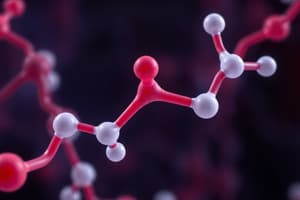Podcast
Questions and Answers
What is the role of neurotransmitters in the nervous system?
What is the role of neurotransmitters in the nervous system?
- They inhibit all forms of neural communication.
- They transmit signals across the synaptic cleft. (correct)
- They serve as structural components of neurons.
- They create electrical impulses for direct transmission.
Which type of synapse allows for direct electrical transmission without neurotransmitters?
Which type of synapse allows for direct electrical transmission without neurotransmitters?
- Chemical-resistance synapse
- Electrical synapse (correct)
- Neurochemical synapse
- Chemical synapse
What factors determine whether a neurotransmitter has an excitatory or inhibitory effect?
What factors determine whether a neurotransmitter has an excitatory or inhibitory effect?
- The type of synapse formed between neurons.
- The specific receptors present on the target neuron. (correct)
- The distance between the synaptic cleft and the neuron.
- The amount of neurotransmitter released.
In anxiety disorders, what is suggested about the impulse activity in the brain?
In anxiety disorders, what is suggested about the impulse activity in the brain?
Which statement accurately describes dopamine as a neurotransmitter?
Which statement accurately describes dopamine as a neurotransmitter?
What is one common characteristic of all neurotransmitters?
What is one common characteristic of all neurotransmitters?
What is the primary role of catechol-O methyl transferase (COMT) in relation to dopamine?
What is the primary role of catechol-O methyl transferase (COMT) in relation to dopamine?
Which neurotransmitters undergo reuptake rather than synaptic degradation?
Which neurotransmitters undergo reuptake rather than synaptic degradation?
What distinguishes neurohormones from neurotransmitters?
What distinguishes neurohormones from neurotransmitters?
Which of the following statements about neurotransmitters is true?
Which of the following statements about neurotransmitters is true?
What is the main effect of serotonin as mentioned in the group assignment?
What is the main effect of serotonin as mentioned in the group assignment?
Why might a depressed person experience gastrointestinal symptoms?
Why might a depressed person experience gastrointestinal symptoms?
What determines how quickly neurotransmitters can have effects in the post-synaptic neuron?
What determines how quickly neurotransmitters can have effects in the post-synaptic neuron?
Which receptors are associated with immediate transmission of neurotransmitter effects?
Which receptors are associated with immediate transmission of neurotransmitter effects?
How is the transmission of metabotropic receptors characterized?
How is the transmission of metabotropic receptors characterized?
What is a key factor influencing the duration of neurotransmitter effects?
What is a key factor influencing the duration of neurotransmitter effects?
What can be concluded about neurotransmitter effects in all cases?
What can be concluded about neurotransmitter effects in all cases?
Which statement about ionotropic and metabotropic receptors is true?
Which statement about ionotropic and metabotropic receptors is true?
Which neurotransmitter action is more likely to involve modulation over time?
Which neurotransmitter action is more likely to involve modulation over time?
What aspect of neurotransmitter effects varies with receptor type?
What aspect of neurotransmitter effects varies with receptor type?
Which stage of neurotransmitter metabolism involves the release to post-synapse receptors?
Which stage of neurotransmitter metabolism involves the release to post-synapse receptors?
What primarily influences the longevity of neurotransmitters?
What primarily influences the longevity of neurotransmitters?
What happens during Stage 2 of neurotransmitter metabolism?
What happens during Stage 2 of neurotransmitter metabolism?
Which type of neurotransmitter requires reuptake before it can be degraded?
Which type of neurotransmitter requires reuptake before it can be degraded?
As the structure of a neurotransmitter becomes more complex, what is the expected outcome?
As the structure of a neurotransmitter becomes more complex, what is the expected outcome?
What process is key for neurotransmitter termination in stages 6 to 9?
What process is key for neurotransmitter termination in stages 6 to 9?
Which neurotransmitter type is characterized by larger molecular size and no requirement for reuptake?
Which neurotransmitter type is characterized by larger molecular size and no requirement for reuptake?
Which stage involves the packing of neurotransmitters into vesicles?
Which stage involves the packing of neurotransmitters into vesicles?
Which mechanism is NOT involved in neurotransmitter termination?
Which mechanism is NOT involved in neurotransmitter termination?
What can affect one or more stages of neurotransmitter metabolism?
What can affect one or more stages of neurotransmitter metabolism?
Flashcards
What are neurotransmitters?
What are neurotransmitters?
Chemical messengers that transmit signals across the synaptic cleft between neurons in the nervous system.
What are electrical synapses?
What are electrical synapses?
These synapses transmit impulses directly to their neighboring nervous cells without the need for neurotransmitters.
What are chemical synapses?
What are chemical synapses?
A type of synapse that uses neurotransmitters for signal transmission.
How can one neurotransmitter have different effects?
How can one neurotransmitter have different effects?
Signup and view all the flashcards
What is excitatory neurotransmitter effect?
What is excitatory neurotransmitter effect?
Signup and view all the flashcards
What is inhibitory neurotransmitter effect?
What is inhibitory neurotransmitter effect?
Signup and view all the flashcards
NT Effect Duration
NT Effect Duration
Signup and view all the flashcards
Ionotropic Receptor
Ionotropic Receptor
Signup and view all the flashcards
Metabotropic Receptor
Metabotropic Receptor
Signup and view all the flashcards
NT Effect Speed
NT Effect Speed
Signup and view all the flashcards
Receptor Determines Speed
Receptor Determines Speed
Signup and view all the flashcards
Ionotropic: Direct Link
Ionotropic: Direct Link
Signup and view all the flashcards
Metabotropic: Indirect Link
Metabotropic: Indirect Link
Signup and view all the flashcards
Receptor Determines Response
Receptor Determines Response
Signup and view all the flashcards
Neurotransmitter Longevity
Neurotransmitter Longevity
Signup and view all the flashcards
Neurotransmitter Metabolism
Neurotransmitter Metabolism
Signup and view all the flashcards
Neurotransmitter Production (Stages 1 & 2)
Neurotransmitter Production (Stages 1 & 2)
Signup and view all the flashcards
Neurotransmitter Packaging (Stage 3)
Neurotransmitter Packaging (Stage 3)
Signup and view all the flashcards
Neurotransmitter Release (Stage 4)
Neurotransmitter Release (Stage 4)
Signup and view all the flashcards
Autoreceptors (Stage 5)
Autoreceptors (Stage 5)
Signup and view all the flashcards
Neurotransmitter Termination
Neurotransmitter Termination
Signup and view all the flashcards
Neurotransmitter Reuptake
Neurotransmitter Reuptake
Signup and view all the flashcards
Neurotransmitter Degradation
Neurotransmitter Degradation
Signup and view all the flashcards
Neurotransmitter Diffusion
Neurotransmitter Diffusion
Signup and view all the flashcards
What are neuromodulators?
What are neuromodulators?
Signup and view all the flashcards
What are neurohormones?
What are neurohormones?
Signup and view all the flashcards
How is dopamine broken down?
How is dopamine broken down?
Signup and view all the flashcards
How are glutamate and GABA recycled?
How are glutamate and GABA recycled?
Signup and view all the flashcards
What is volume transmission?
What is volume transmission?
Signup and view all the flashcards
Why can neurotransmitters affect a wide area in the brain?
Why can neurotransmitters affect a wide area in the brain?
Signup and view all the flashcards
Study Notes
Basic Concepts of Neurotransmitter Biochemistry
- Neurotransmission in synapses is a crucial process
- Neurotransmitters (NT) have specific characteristics and metabolisms
- Applications of neurotransmission are significant in clinical settings
What Happens in Depression?
- Mood is affected negatively
- Energy levels are reduced
- Sleep patterns are disrupted
- Other symptoms may also occur
- Impulses in the brain are relevant
Parts of the Brain and Neurotransmitters
- Different brain regions are responsible for various functions (e.g., motoric, sensory, emotional)
- Most of these functions are driven by neurotransmitters (NT)
What are Neurotransmitters (NT) Actually?
- Synapses use NT for signal transduction
- NT are chemical messengers
- NT transmit signals across the synaptic cleft between neurons
Structures of Neurotransmitters
- A variety of NT structures exist
- Adrenaline, Noradrenaline, Dopamine, Serotonin, GABA, Acetylcholine, Glutamate, and Endorphins are examples of neurotransmitters
Do All Synapses Require NT?
- Some synapses connect directly, transmitting impulses electrically (electrical synapse).
- Other synapses require NT to transmit impulses (chemical synapse).
What Happens in Anxiety?
- Impulses may be excessive
- Impulses may lack inhibition
Types of Neurotransmitter Effects
- NT effects can be excitatory, inhibitory, or both (excitatory and inhibitory)
Inhibitory and Excitatory Neurotransmitters (NT)
- The effect of a NT depends on the specific receptor
- One NT can have various receptors
- Some NTs can have both excitatory and inhibitory effects depending on location and context (e.g., dopamine)
Dopamine Receptors
- Dopamine (DA) has specific receptors (D1, D5, D2, D3, D4)
How Quick NTs Have Effects?
- NT effects can be immediate or take longer depending on the type of receptor on the post-synaptic neuron
- The speed of the NT effect isn't contingent on the quantity of NT, rather the receptor type.
Ionotropic and Metabotropic NT Receptors
- Ionotropic receptors are ligand-gated ion channels (immediate transmission)
- Metabotropic receptors involve G-protein coupled receptors (longer transmission)
How Long NT Effects Last?
- The length of NT effects depends mostly on metabolism factors.
General Concept of NT Metabolism
- NT are produced, accumulated, and packaged in vesicles
- NT are released and bind to receptors
- NT reuptake or degradation terminates the signal
Degradation and Diffusion Depend on NT Structure
- Higher complexity neurotransmitters are more resistant to degradation.
- The simple structure of monoamines (e.g., dopamine) allows easy degradation.
- The degradation and diffusion methods vary across different types of NT
Example of NT Degradation: Dopamine
- Dopamine is degraded via monoamine oxidase (MAO) and catechol-O-methyltransferase (COMT).
- Byproducts include homovanillic acid (HVA), 3-methoxytyramine.
Amino Acids NT: GABA (Gamma-Aminobutyric Acid)
- Glutamate and GABA need to be reuptaken, no synaptic degradation
Why the Signal/NT Can Affect Many Areas in the Brain?
- NT signals can spread to other brain areas, as they're not limited to the synaptic cleft.
- NT effects might spread throughout brain regions.
Categories of Neurotransmitters
- Neurotransmitters
- Neuromodulators
- Neurohormones
Group Assignments (instruction for group projects)
Big Picture
- Neurotransmitters are essential for various nervous system functions
- They regulate and adapt connections
- They facilitate a range of signaling mechanisms
Summary
- Synaptic clefts require NT for impulse propagation
- Propagation can be excitatory or inhibitory
- NT receptor types impact effects, while receptor expression can change over time
- NT metabolism and structures dictate how long their effects last
Studying That Suits You
Use AI to generate personalized quizzes and flashcards to suit your learning preferences.


